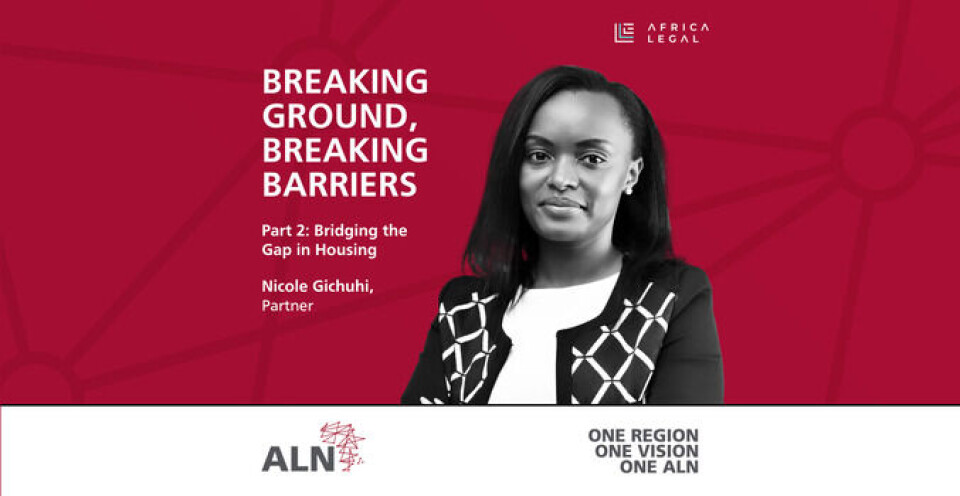Copyright : Re-publication of this article is authorised only in the following circumstances; the writer and Africa Legal are both recognised as the author and the website address www.africa-legal.com and original article link are back linked. Re-publication without both must be preauthorised by contacting editor@africa-legal.com
Bridging the gap in housing

Surging population growth and a changing world are demanding new solutions in East Africa’s real estate and construction landscape. In this second article in our miniseries on Africa's REC landscape, Nicole Gichuhi spoke to Craig Sisterson about industry trends and opportunities.
High population growth in East Africa and a surging demand for housing has sparked conversations between government and developers to improve the supply of much-needed affordable housing, says ALN Kenya partner and real estate expert Nicole Gichuhi.
“There have been a lot of discussions about sustainability, green construction practices and digitisation of real estate transactions, and there’s been a really big focus on affordable housing,” Gichuhi explained. “In Kenya there's a significant opportunity in the housing sector. While there’s an annual demand of around a quarter of a million housing units per year, the current supply is only about 50 000 units, highlighting a vast potential for growth and development in this area.”
A very small percentage of those new units target lower income families, noted Gichuhi, and that exacerbates the massive gap between demand and supply. Given budgetary constraints, governments are unable to meet this demand alone, so in recent times there’s been much more engagement with the private sector to collaborate on bridging the deficit.
Based on industry insights and interactions, Gichuhi says there are several developers actively considering or working on diversifying their portfolios to incorporate offerings in the affordable housing segment.
Gichuhi and her colleagues at ALN Kenya | Anjarwalla & Khanna, East Africa’s largest full-service firm, have been engaged in high-level discussions with developers, government and other key industry players, aimed at formulating policies and strategies on affordable housing.
“There are lots of people who are now interested in supporting and collaborating with the government on this issue, but there’s a need to align government policy and the needs of private investors,” she explained. “We’ve also worked on several MOUs and strategic partnership documents as part of proposals for developers to be involved in the affordable housing space.”
The key, stresses Gichuhi, is ensuring all these discussions about potential regulatory and policy changes actually lead to affordable housing being something that comes to life.
Gichuhi also noted several other fresh trends in real estate and construction in East Africa and beyond that are worth watching and which could provide great opportunities.
“We’ve recently seen more developers in Kenya and Tanzania embracing rent-to-own schemes where they build houses and allow the homeowners to occupy as tenants and pay the purchase price off in instalments,” she said.
Another growing opportunity is the demand for properties to host data centres, as requirements grow for data to be stored locally as opposed to offshore. Gichuhi observes a fascinating convergence of this emerging market with sustainable energy, as investors look to set up data centres near reliable renewable energy power plants.
Kenya’s legislative reforms mandate that real estate developers integrate renewable sources such as solar water heating in their buildings with hot water requirements of a certain daily capacity. With Nairobi having recently hosted the Africa Climate Summit, Gichuhi anticipates a growing emphasis on policies promoting sustainable construction practices in the coming years.
To join Africa Legal's mailing list please click here
